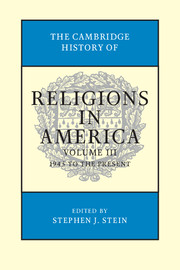Book contents
- Frontmatter
- SECTION I THE POSTWAR RELIGIOUS WORLD, 1945 AND FOLLOWING
- SECTION II CONTROVERSIAL ISSUES IN TRANSITIONAL TIMES
- SECTION III THE WORLD’s RELIGIONS IN AMERICA
- SECTION IV RELIGIOUS AND CULTURAL CONFLICT IN AMERICA
- SECTION V NEW AND CONTINUING RELIGIOUS REALITIES IN AMERICA
- 26 Post 9/11: America Agonizes over Islam
- 27 The Megachurch Phenomenon: Reshaping Church and Faith for the Twenty-First Century
- 28 Roman Catholicism in America at the Beginning of the Twenty-First Century
- 29 New Technologies
- 30 Reading Race and American Televangelism
- 31 Religion, Government, and Law in the Contemporary United States
- 32 Religious Thought in America: 1945 to the Present
- 33 Religion and Missions
- SECTION VI CONCLUDING ESSAYS
- Index
- References
26 - Post 9/11: America Agonizes over Islam
from SECTION V - NEW AND CONTINUING RELIGIOUS REALITIES IN AMERICA
Published online by Cambridge University Press: 28 July 2012
- Frontmatter
- SECTION I THE POSTWAR RELIGIOUS WORLD, 1945 AND FOLLOWING
- SECTION II CONTROVERSIAL ISSUES IN TRANSITIONAL TIMES
- SECTION III THE WORLD’s RELIGIONS IN AMERICA
- SECTION IV RELIGIOUS AND CULTURAL CONFLICT IN AMERICA
- SECTION V NEW AND CONTINUING RELIGIOUS REALITIES IN AMERICA
- 26 Post 9/11: America Agonizes over Islam
- 27 The Megachurch Phenomenon: Reshaping Church and Faith for the Twenty-First Century
- 28 Roman Catholicism in America at the Beginning of the Twenty-First Century
- 29 New Technologies
- 30 Reading Race and American Televangelism
- 31 Religion, Government, and Law in the Contemporary United States
- 32 Religious Thought in America: 1945 to the Present
- 33 Religion and Missions
- SECTION VI CONCLUDING ESSAYS
- Index
- References
Summary
The terrorist attacks on several American cities on 11 September 2001, by Muslim militants linked to al-Qaeda negatively affected the disposition of many Americans toward Islam. These seismic events have also engendered a surge of latent religion into the public square. All the major religious traditions in the United States gained more visibility in national politics, ranging from tacit endorsements for presidential candidates and fervent debates over morally divisive issues, to aggressive evangelical activities at home and abroad. This surge in religious momentum raised questions whether America was heading toward a postsecular society, given debates about America as a Christian nation and the religiously inflected moral debates in public.
Internationally, the United States–sponsored wars in Afghanistan and then Iraq, followed by worldwide security sweeps, negatively affected America’s once-credible global image. In the non-West, especially in large swaths of the Muslim world, but also in parts of Europe, America’s image as a superpower morphed into that of a resented imperial power. Not since the Vietnam War had domestic and international politics become so intensely intertwined, but with one crucial difference. If the scourge during Vietnam was the red peril of Communism, then in the minds of significant sections of the U.S. public the threat in the first decade of the new century stemmed from Islam generally, and militant Islam, in particular.
- Type
- Chapter
- Information
- The Cambridge History of Religions in America , pp. 551 - 574Publisher: Cambridge University PressPrint publication year: 2009



